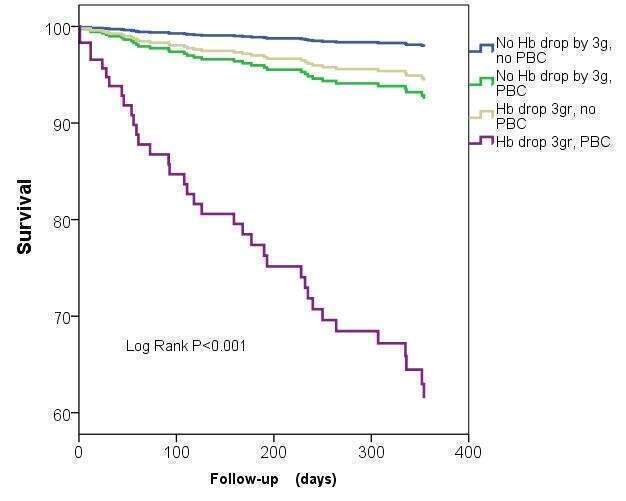Background: Despite the minimally invasive nature of trans-catheter aortic valve implantation (TAVI), this procedure is associated with several serious complications. We analyzed the impact of bleeding events, hemoglobin (Hb) drop, and blood transfusion on prognosis of TAVI.
Methods: We analyzed 363 consecutive patients who underwent transfemoral TAVI in our institute. Hb levels at baseline, post procedure and at discharge were included, as well as blood transfusions and incidence of major and life threatening bleedings. In order to analyze impact of Hb drop and blood transfusion on outcome we divided our study cohort to 4 groups according to Hb drop (less or ≥ than 3 g/dl) and receiving blood transfusion (yes /no) during hospitalization
Results: Mean Hb level decreased following TAVI (11.6±1.4 to 9.6 ±1.3 g/dl; p<0.001). Major/ life threatening bleedings occurred in 46 (12.6%) patients, and 135 (37%) patients received blood transfusion. Major and life threatening bleedings were not independently associated with increased 1 year mortality. Among patients with Hb drop of < 3 g/dl, those who received blood transfusion showed increased 1 year mortality (HR 3.6 CI 1.4-9.6; P<0.008). Among patients with Hb drop of ≥ 3 g/dl the Hb drop per se had no significant impact on survival (HR 2.7 CI 0.7-9.8; p=0.12), while those that received blood transfusion presented a significantly increased mortality at 1 year (HR 23 CI 7-72; p<0.001).
Conclusions: Hb drop is a frequent finding after TAVI. Hb drop per se does not have an effect on 1-year mortality. Blood transfusion, regardless of the degree of Hb drop, is strongly associated with increased mortality after TAVI, emphasizing the clinical dilemma regarding the benefit of blood transfusion in TAVI patients.


